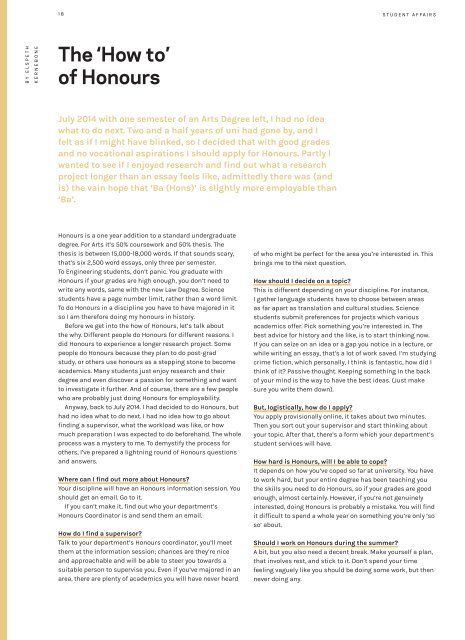Create successful ePaper yourself
Turn your PDF publications into a flip-book with our unique Google optimized e-Paper software.
18<br />
STUDENT AFFAIRS<br />
BY ELSPETH<br />
KERNEBONE<br />
The ‘How to’<br />
of Honours<br />
July 2014 with one semester of an Arts Degree left, I had no idea<br />
what to do next. Two and a half years of uni had gone by, and I<br />
felt as if I might have blinked, so I decided that with good grades<br />
and no vocational aspirations I should apply for Honours. Partly I<br />
wanted to see if I enjoyed research and find out what a research<br />
project longer than an essay feels like, admittedly there was (and<br />
is) the vain hope that ‘Ba (Hons)’ is slightly more employable than<br />
‘Ba’.<br />
Honours is a one year addition to a standard undergraduate<br />
degree. For Arts it’s 50% coursework and 50% thesis. The<br />
thesis is between 15,000-18,000 words. If that sounds scary,<br />
that’s six 2,500 word essays, only three per semester.<br />
To Engineering students, don’t panic. You graduate with<br />
Honours if your grades are high enough, you don’t need to<br />
write any words, same with the new Law Degree. Science<br />
students have a page number limit, rather than a word limit.<br />
To do Honours in a discipline you have to have majored in it<br />
so I am therefore doing my honours in history.<br />
Before we get into the how of Honours, let’s talk about<br />
the why. Different people do Honours for different reasons. I<br />
did Honours to experience a longer research project. Some<br />
people do Honours because they plan to do post-grad<br />
study, or others use honours as a stepping stone to become<br />
academics. Many students just enjoy research and their<br />
degree and even discover a passion for something and want<br />
to investigate it further. And of course, there are a few people<br />
who are probably just doing Honours for employability.<br />
Anyway, back to July 2014. I had decided to do Honours, but<br />
had no idea what to do next. I had no idea how to go about<br />
finding a supervisor, what the workload was like, or how<br />
much preparation I was expected to do beforehand. The whole<br />
process was a mystery to me. To demystify the process for<br />
others, I’ve prepared a lightning round of Honours questions<br />
and answers.<br />
Where can I find out more about Honours?<br />
Your discipline will have an Honours information session. You<br />
should get an email. Go to it.<br />
If you can’t make it, find out who your department’s<br />
Honours Coordinator is and send them an email.<br />
How do I find a supervisor?<br />
Talk to your department’s Honours coordinator, you’ll meet<br />
them at the information session; chances are they’re nice<br />
and approachable and will be able to steer you towards a<br />
suitable person to supervise you. Even if you’ve majored in an<br />
area, there are plenty of academics you will have never heard<br />
of who might be perfect for the area you’re interested in. This<br />
brings me to the next question.<br />
How should I decide on a topic?<br />
This is different depending on your discipline. For instance,<br />
I gather language students have to choose between areas<br />
as far apart as translation and cultural studies. Science<br />
students submit preferences for projects which various<br />
academics offer. Pick something you’re interested in. The<br />
best advice for history and the like, is to start thinking now.<br />
If you can seize on an idea or a gap you notice in a lecture, or<br />
while writing an essay, that’s a lot of work saved. I’m studying<br />
crime fiction, which personally, I think is fantastic, how did I<br />
think of it? Passive thought. Keeping something in the back<br />
of your mind is the way to have the best ideas. (Just make<br />
sure you write them down).<br />
But, logistically, how do I apply?<br />
You apply provisionally online, it takes about two minutes.<br />
Then you sort out your supervisor and start thinking about<br />
your topic. After that, there’s a form which your department’s<br />
student services will have.<br />
How hard is Honours, will I be able to cope?<br />
It depends on how you’ve coped so far at university. You have<br />
to work hard, but your entire degree has been teaching you<br />
the skills you need to do Honours, so if your grades are good<br />
enough, almost certainly. However, if you’re not genuinely<br />
interested, doing Honours is probably a mistake. You will find<br />
it difficult to spend a whole year on something you’re only ‘so<br />
so’ about.<br />
Should I work on Honours during the summer?<br />
A bit, but you also need a decent break. Make yourself a plan,<br />
that involves rest, and stick to it. Don’t spend your time<br />
feeling vaguely like you should be doing some work, but then<br />
never doing any.


















